Despite the steady rise in the number of holiday destinations claiming to be green or responsible, the existing system of international tourism is utterly not sustainable.
Thanks to the use of the same industrial model that has been developed for consumer goods, houses, and cars, mass international tourism has grown since the 1950s and swept into different parts of the world including airports, golf courses, real estate, jobs, and washing up cash.
Widely considered as one of the best stimulants for economic recovery, tourism is without a doubt a force to reckon with. It generates over £2.1tn in yearly revenues. In different regions and countries around the world, tourism is currently the main source of cash, employment, and foreign exchange.
The tourism sector resembles an ultra-fast train, packed with passengers with cheaper tickets racing towards the edge of a cliff. Therefore, it is worth asking why the most popular holiday destinations are terrible for the environment.
How To End The Unsustainable Holiday Destinations
There’s no doubt the media makes lots of money from market holiday locations across the world, but on a broader perspective, perhaps regulators, customers, and providers have also become addicted to the pleasures and promises of cheap travel which is the prospect of travelling without much to think about.
It turns out the challenge is more complex than just a perspective of a depraved environment. Some industries seem to be financially running themselves into the ground as the margins reduce to razor-thin. On the other hand, because of the overuse or congestion of scarce land resources and water, some holiday destinations are destroying the attractions and landscapes, both cultural and natural, upon where they depend.
Below are some reasons why popular holiday destinations aren’t good for the environment and we need to focus on the alternatives.
- Mass tourism is based on the consumption, distribution, and assembly of packaged products. As a result, one product can be used instead of the other. The commodification of what ought to be considered to be unique is worsened by the use of industrial cost-cutting approaches of automation, standardization, and homogenization which further strips out any remaining difference.
- In many youthful destinations, zero regulation and lack of entry barriers encourage speculation and rapid growth. Local developers and politicians benefit greatly from this growth, even though they don’t stay long enough to deal with the negative effects caused by the volatile demand and overcapacity.
- Perishable products – It’s a service that’s time-based and cannot be stocked. Therefore, when capacity increases and demand reduces, price discounting is an adaptive tactic.
- Price comparison engines and technological connectivity has shifted the power of purchasing to consumers that have been convinced by additional discounting, that cheap travel isn’t a privilege, but a right. This further accelerates the downside pressure on yields and prices.
- Residents of tourism destinations who might have welcomed the first batch of visitors stopped soon after realizing that cheap travel does not minimize their costs. The visitors cause infrastructure, housing, water, food, and land prices to get up at a rate that closely correlates with the drop in tourism operator margins.
Bottom Line
We need to come up with ideas of conscious travel and then start imagining better alternatives. Even though there is no silver bullet or magic wand, changes should be done at the grassroots level.
For starters, the hosts need to wake up and start seeing their world differently, not just as a resource waiting to be exploited, but also like a sacred place that needs to be shielded as well as celebrated for its uniqueness.
References
McGrath, M. (2021, August 9). Climate change: Five things we have learned from the IPCC report. BBC News. https://www.bbc.com/news/science-environment-58138714
Winter, K. (2020, November 23). Going on holiday doesn’t have to be bad for the environment: The rise and rise of eco-travel. Metro. https://metro.co.uk/2020/09/17/going-holiday-doesnt-bad-environment-rise-rise-eco-travel-12423381/
Climate crisis: ‘We don’t fly to go on holiday now – and it doesn’t cost the earth’. (2019, August 12). the Guardian. https://www.theguardian.com/money/2019/aug/10/climate-crisis-holiday-no-fly-trains-ferries

